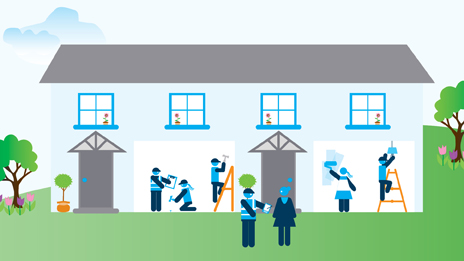
10 million people. That’s how many of us live in social housing in the UK: nearly 20% of our housing stock is owned by social landlords. With nearly 4 million homes to operate, they face a formidable maintenance task and, in the main, they’re trying to do it with out of date tools – housing management systems straight out of the 1990s, multiple incompatible processes and a mass of silo’d data.
So in a world where us civilians are coming to terms with Smart Homes, even if we don’t have a clear business case, why aren’t social landlords engaging with technology? It has the potential to massively increase the efficiency of their business or even completely restructure the way housing is delivered. Imagine a housing provider who provides a platform for tenants to self manage their own properties – or a housing provider who rolls provision of all utilities and social care into the rent.
More practically, using the right analytics, imagine a housing provider who can identify and diagnose problems with a building’s fabric or systems remotely and ensure the right team, with the right tools, are deployed to provide the right solutions. Or using the same data to single out the homes that are eligible for funding for improvements.
This is a future that HACT – the Housing Association Charitable Trust – wants to create. Faced with substantial challenges over the next five years – cuts in benefits budget, the escalating price of housing – HACT knows the social housing sector needs to embrace innovation to survive so they have been digging into the barriers and challenges that are slowing progress. Their new manifesto (Is Housing Really Ready to Go Digital), identifies three barriers to change and what can be done about them:
– Little visible leadership and accountability for technology at board level. Consequently tech is generally treated as a cost item, rather than an opportunity for fundamental change. Worse, where technology projects are commissioned, there is little embedded expertise in what can be delivered or how to measure accountability.
– As a result, an over-reliance on consultant-led change. Without clear leadership on the potential of technology, consulting projects tend to focus on rationalising existing systems.
– Low understanding of the potential value of data. Although housing has a huge amount of data it is too poorly structured and tools for effective analysis are generally lacking.
HACT’s manifesto has practical suggestions for how to deal with these problems – starting with a programme to match UK digital leaders with housing provider boards, and supporting their involvement in the business transformations that can result.
For those of us living and breathing tech every day, it’s easy to underestimate the challenges involved in promoting tech initiatives in sectors like housing. Bridging the ‘Digital Governance Gap’ in housing is not only challenging, it could be transformative for millions of people. If you want to know more about how to get involved, check out HACT’s Digital page.
